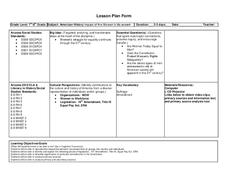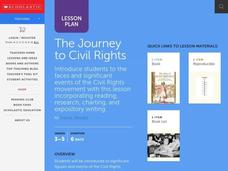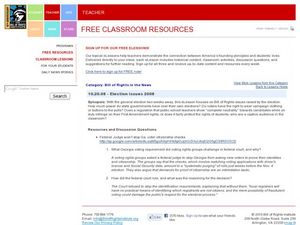K20 LEARN
Government and Your Right To Vote: Voting Rights In America
Gaining voting rights was difficult over the course of decades, but the debate over who should actually be allowed to cast a ballot remains. Scholars explore the history of the struggle, including the fifteenth and nineteenth amendments,...
Middle Tennessee State University
Fights, Freedom, and Fraud: Voting Rights in the Reconstruction Era
As part of a study of post Civil War era, young historians investigate the changes in voting rights during the Reconstruction Era (1863-1876), the fraud involved in the Hayes-Tilden presidential election of 1876, and efforts by Pap...
K20 LEARN
Show Me Your Credentials: Voting In America
The debate over voting rights continues. To begin their study of voting rights, class members first vote on proposed new classroom rules. After a discussion of the activity, groups are given a copy of the 1965 Alabama Literacy Test and...
City University of New York
Jim Crow and the Fight for Civil Rights
The history of voting rights in America has always been rocky, especially in the time period after the Civil War. Learn about the ways that Jim Crow laws affected the voting rights of African Americans with a lesson featuring primary...
Curated OER
Rights in Early America
Get your historians to hop into someone else's 18th century shoes with a simulation on rights in early America. Each individual gets an identity card, indicating their race, gender, and status (slave or free). Areas around the room are...
PBS
Out of the Shadows | Black America Since MLK: And Still I Rise
Two powerful video clips launch a study of race relations in the United States after the Selma, Alabama riots, the passage of the Votings Rights Act, and the riots in Watts, California.
Mikva Challenge
Why Vote?
Elections are supposed to represent the will of the people. So why don't 100% of registered voters line up at the polls on Election Day? High schoolers study the last few elections and the voter turnout for each, according to race,...
NYC Department of Records
Citizenship and Elections: The Importance of a Ballot
Approximately 58 prcent of those eligible voted in the 2016 US Presidential election. In an attempt to impress upon learners the importance of voting and voting rights, class members examine primary source documents related to the...
Curated OER
Jacksonian America and the Indian Removal Act of 1830
Students utilize primary sources to explore the national climate concerning Native American Indians during the Andrew Jackson administration. They are presented with opinions for and against the Indian Removial Act of 1830 as they...
Close Up Foundation
Teach the Vote
Why is voting important? A social studies unit presents a non-partisan approach to the importance of voting, to voting laws and procedures, and to resources that voters need to become informed voters.
Arizona Department of Education
American History Impact of the Women’s Movement
Take a look at important images that depict the women's suffrage movement, the support for the Equal Rights Amendment, and wage equity for women over the last two centuries. As class members work through a lesson on primary source...
Center for History Education
Helping to Move On? An Analysis of the Reconstruction Amendments
Reconstruction amendments: a helping hand or another form of slavery? An inquisitive lesson plan compares the Reconstruction legislation that ended slavery, granted citizenship, and protected voting right for African American men....
Curated OER
It is Our Right-Don't Waste It!
Young scholars explore the basic rights granted to all American citizens by the U.S. Constitution in the light of women's issues. The women's suffrage movement, the role of Susan B. Anthony, and the timeline of events on voting rights...
Library of Congress
Suffragists and Their Tactics
Students research the fight for voting rights. In this women's history lesson, students analyze primary sources to develop an understanding of the strategies employed by the suffragists to gain voting rights.
Curated OER
ONE VOTE
In order to understand the political process and the importance of voting, pupils will construct a class time line. They will group up and research a specific era, creating a time line of political events where one vote made a...
Curated OER
Fight For Your Right - Leading A Revolution of Change
Learners examine civil rights. For this civil rights lesson, students research human rights issues of United States history. Learners then discuss their research findings and write Bill of Rights statements for the topics they researched.
Curated OER
Activism and Social Reform in America from 1800-1850
Students discuss idea of social status, examine antebellum social reform movements, and compare and contrast experiences of activists who sought to improve workers' lives, end slavery, reform immigration laws, and establish voting rights...
Curated OER
How Women Won the Right to Vote
Students consider how women gained the right to vote in America. For this suffrage lesson, students investigate major events of the suffrage movement and conduct research. Students also role play petitioning to President Wilson to get...
Curated OER
The Journey to Civil Rights
Students investigate the concepts that surround the Civil Rights Movement. They conduct research with the help of the teacher and use chart paper to create posters about major people involved. Students also complete a timeline graphic...
Curated OER
We Have Rights
Students investigate the concept of having rights as citizens. In this citizenship instructional activity, students examine the rights that are given to citizens of the United States in the Bill of Rights. They draw pictures of eight of...
Curated OER
Bill of Rights in the News: Election Issues 2008
Students consider First Amendment rights. In this Bill of Rights lesson, students complete an activity guide regarding constitutional rights issues raised in the 2008 presidential election. Students respond to discussion questions...
Center for History Education
Democratic Ideas of the 1776 Maryland Constitution
1776 was a year of political upheaval in the American colonies. Academics examine the Maryland Constitution to understand the desire to break with Great Britain. Young historians learn about Maryland's efforts to extend rights to its...
Curated OER
The Constitution and The Bill of Rights
Studnets explore the events and issues surrounding the Constitutional Convenetion and the Bill of Rights through web-sites interacting with such topics as the framers, court cases, games and more.
Curated OER
Right to vote...in the wrong place
Students create a presentation for other class members or for a local citizens' group explaining how they can guard ensure voter rights. Students research the Ohio Secretary of State's stand on provisional voting rules.

























